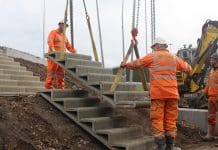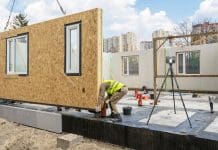RICS has released a policy position urging ministers to seriously consider how offsite manufacturing and Modern Methods of Construction (MMC) could help ease the ongoing housing crisis
According to RICS, offsite manufacturing and Modern Methods of Construction (MMC) represent an opportunity to address the many productivity issues facing the construction sector, in addition to increasing capacity and investment in the industry.
RICS says the government must support MMC both, directly through investment and indirectly through planning, education and construction and design quality standards and programmes, including encouraging and incentivising construction of MMC factories in areas of high unemployment as part of the Industrial Strategy.
RICS research paper, ‘Forward Thinking Solution to the Housing Crisis’ looks at several different technologies as constructed on site. The locations and design standards of the projects were impressive with the mortgage-ability demonstrated by sale into the owner-occupied market.
In its report, RICS recommends:
- Government should strengthen its presumption in favour of MMC in public infrastructure schemes.
- Government should support local authorities and housing associations through financial incentives and policy to meet housing need through MMC.
- Government should acknowledge the potential social value benefits of MMC including for elderly, disabled, and homelessness needs.
- Government should promote for MMC products, the development of guarantees, warranties and accreditations which have a similar level of lender and consumer confidence as those available for standard construction.
- Government and industry should endorse or acknowledge the guidance to be released by RICS which will create familiarity with products on offer, their properties, and their value;
- Government needs to support through policy and funding, the upskilling of the existing workforce to meet the needs of MMC.
- Government should explore encouraging and incentivising construction of MMC factories in areas of high unemployment.
- Government should look at updating building regulations recognising the differing construction methodologies of MMC to traditional build, including its use of information technology.
- Government should seek to give risk mitigation to potential new entrants, SMEs and suppliers.
Definitions of Modern Methods of Construction
RICS supports the MMC definition framework published by MHCLG working group chaired by Mark Farmer. We have been one of the influential voices on the group, particularly with regard to survey, valuation, digitisation and metrics.
Social value for MMC
Faster delivery of MMC new build compared to traditional builds allows for them to be a greater server to the social housing sector, providing a premium as rental cashflow comes onstream sooner. Many housing associations are already utilising this new technique to deliver much needed housing, with some setting up their own production units.
As MMC is more adaptable/customisable housing authorities can also build more housing to meet the requirements of different participants, such as those with disabilities or the elderly.
Recommendations
- Government should strengthen its presumption in favour of MMC in public infrastructure schemes.
- Government should support local authorities and housing associations through financial incentives and policy to meet housing need through MMC.
- Government should acknowledge the potential social value benefits of MMC including for elderly, disabled, and homelessness needs.
Financial impacts of MMC
From a cost, value and performance perspective, modern offsite construction is relatively untested and is still in an evolutionary phase. Data on the costs of construction, value and performance of using offsite is not robust yet, and as techniques evolve, cost information and performance changes, and previous data becomes obsolete. This makes it hard for the industry to estimate costs, assess benefits and plan appropriately.
This is an issue for investors, lenders, valuers and insurance/warranty providers naturally concerned about product durability, value and ongoing maintenance cost. The Build Offsite Property Assurance Scheme (BOPAS) constitutes a significant provider of confidence and assurance in this sector by warranting specific construction systems.
Recommendations
- Government should promote MMC products, the development of guarantees which have a similar level of lender and consumer confidence as those available for standard construction.
- Government and industry should endorse or acknowledge the guidance to be released by RICS which will create familiarity with products on offer, their properties, and their value.
Skills in MMC
MMC can help stimulate economies in less performing areas of the country. Much has been made of the Northern Powerhouse and Midlands Engine, regions which have been traditionally industrial and manufacturing hubs now experiencing contraction as traditional industries move out or shut down.
MMC requires many of the same skills base and simple retraining could utilise the workforce of these regions, especially the steel, car manufacturing and other fabrication industries.
Government and industry need to collaborate to establish apprenticeships and training products that support the rollout of MMC and encourage new entrants into construction.
This will need to be funded and enabled strategically, including the encouragement of SMEs.
Recommendations
- Government needs to support through policy and funding for upskilling of the existing workforce to meet the needs of MMC.
- Government should explore encouraging and incentivising the construction of MMC factories in areas of high unemployment.
MMC technology
The utilisation of pre-manufacturing technologies brings construction into the modern age by transferring production to the factory.
Digitisation may be deployed both in the production process to achieve precision engineering and assembly, and through Building Information Modelling (BIM) (and successor models).
Digitisation has the potential to transform stakeholder confidence in the product including that of investors, manufacturers, builders, surveyors, lenders, insurers, managers, and, of course, consumers.
Private sector investment in MMC is already widespread. However, more can be done to create an environment of cooperation and joint venture, particularly to encourage SMEs to access and invest in larger production plants.
Recommendations
- Government must look at updating building regulations recognising the differing construction methodologies of MMC to traditional build, including its use of information technology.
- Government should seek to give risk mitigation to potential new entrants, SME’s and suppliers.

















